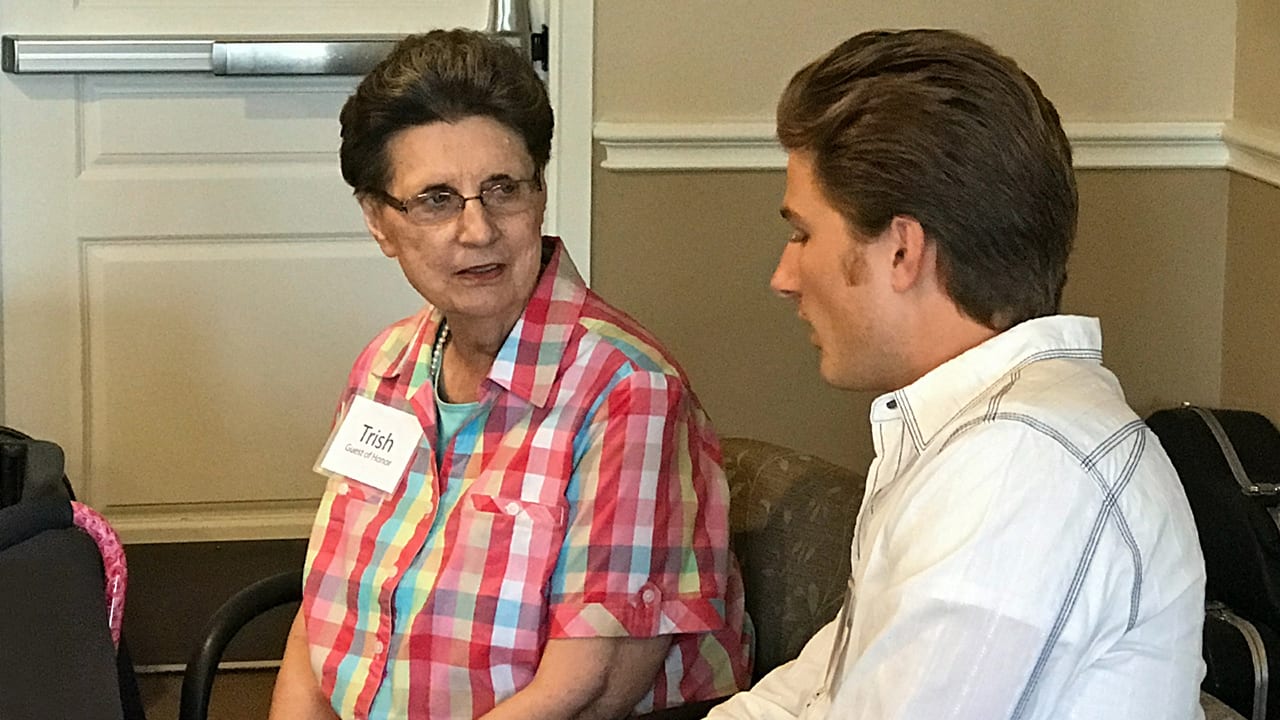by Eric Kolb, co-founder of Songs & Smiles
***********************
My mother-in-law, Trish, loved to talk. She was polite and engaging, a good listener ready to share a kind word of encouragement. Her friends and family always looked forward to talking with her.
But Alzheimer’s changed how Trish was able to engage in conversations. When she started losing her ability to store new memories, we had to learn new ways to talk with her.
Rethinking Conversation
Think of how many conversations you have had during your lifetime. You have had years of practice. And you have developed many practical habits, such as asking questions, sharing details, correcting mistakes, and building on earlier conversations.
Such habits help when talking with a normally functioning person. But when talking with someone who has Alzheimer’s, you need a new set of habits.
When I tried talking with Trish the same way I always had, both of us usually ended up frustrated, confused, and discouraged. So, I started rethinking how to have conversations with her and others living with Alzheimer’s. I sought advice from other caregivers, and I tried new methods. Several books were extremely helpful to me, especially “Creating Moments of Joy” by Jolene Brackey and “Contented Dementia” by Oliver James.
As I started thinking differently, I started having better conversations with Trish. Frustration and confusion didn’t disappear completely. But more and more of our conversations were now marked by laughter, kindness, and joy.
I was learning to adapt. I was recognizing that Alzheimer’s had stolen Trish’s ability to store new memories. And I was adapting my behavior accordingly. By changing my thinking and my actions, I was helping Trish feel more comfortable. When she felt more comfortable, she was more likely to be polite and encouraging. In other words, she was more like herself.
Eventually I made a list of things I knew I needed to keep in mind when I was talking with Trish.
4 Helpful Habits for Talking With Someone Who Has Alzheimer’s:
- Make statements
- Share feelings
- Always agree
- Start fresh
I’m still developing these habits myself, but I know how helpful each can be. These habits guided me as I cared for my mother-in-law and continue to guide me today whenever I find myself talking with someone who has Alzheimer’s.
It’s a simple list. But putting these four things into practice can be challenging. Why? Because each involves a new way of thinking. They go against what you’ve been taught. In fact, each of these simple statements involves a complete reversal of some of our most common habits of conservation. To make this clear, here are those four helpful habits again, this time paired with the habit each is replacing:
- Make statements (instead of asking questions)
Example of what not to say: “Are you hungry? What do you want for breakfast?”
Instead, try: “It’s almost time for breakfast. Pancakes sound good to me.” - Share feelings (instead of details)
Example of what not to say: “Your sister is flying in from San Francisco this afternoon at 2:36 p.m., so I’ll pick her up at the airport and we’ll drive straight here. If her flight is on time, we should be here by 4 at the latest.”
Instead, try: “I’m so happy. Your sister is coming to visit you today. She loves you so much.” - Always agree (instead of correcting mistakes)
Example of what not to say: “No. Your daughter isn’t coming today. She has to work.”
Instead, try: “Yes. Your daughter loves you, and she likes to come and see you.” - Start fresh (instead of building on earlier conversations)
Example of what not to say: “Yesterday you said you wanted to go for a drive in the country, so that’s what we’re doing.”
Instead, try: “Today would be a beautiful day for a drive in the country.”
Practice, Practice, Practice
Habits form over time. You will need training and practice. Some of these new habits may feel unnatural. That’s okay. Keep at it. You will get better. As you develop these habits, you will start to experience more enjoyable and more productive conversations.
Developing new habits of conversation is especially challenging when talking with a loved one, such as a parent or a spouse. You have grown accustomed to how conversation happens between you and those closest to you. You cherish the back and forth, the give and take. You have come to rely on the responses of your loved one.
My wife, Sheryl, had enjoyed a lifetime of quality conversations with her mom. She had learned to rely on her mom’s ability to accurately answer her questions. For her entire life, Sheryl had been able to go to her mom and share new stories and details of her life. Practicing new habits of conversation felt unnatural and reminded her of what she had lost.
Paying Attention
Talking with someone who has Alzheimer’s, especially a loved on, can be challenging. But the rewards are immeasurable. Sheryl and I started learning to grieve for the loss of the easy give-and-take chats we used to have with her mom. At the same time, we were developing new habits and learning to cherish each new conversation.
We started learning to pay close attention to Trish’s responses, and we started learning what to say and what not to say. Trial and error, mixed with patience, can be a wonderful teacher.
Let your loved one who has Alzheimer’s become your guide. If something you say upsets them, try saying something else. Or, at least, try saying it in a different way. If something you say or do makes the person smile, keep that up and try more of the same.
Learn new habits. Work on making statements, instead of asking questions. Focus on sharing feelings instead of facts and details. Practice agreeing, instead of correcting mistakes and misconceptions. And learn to start fresh, recognizing the potential for joy in each new day and each new conversation.



Thank you SO MUCH for this easy to remember list of things to remember in our conversations! I found them very helpful when my father-in-law came to visit over Christmas.
You’re so welcome. We’re glad you were able to spend time together over Christmas.
These are wonderful tips. Thank you so much.